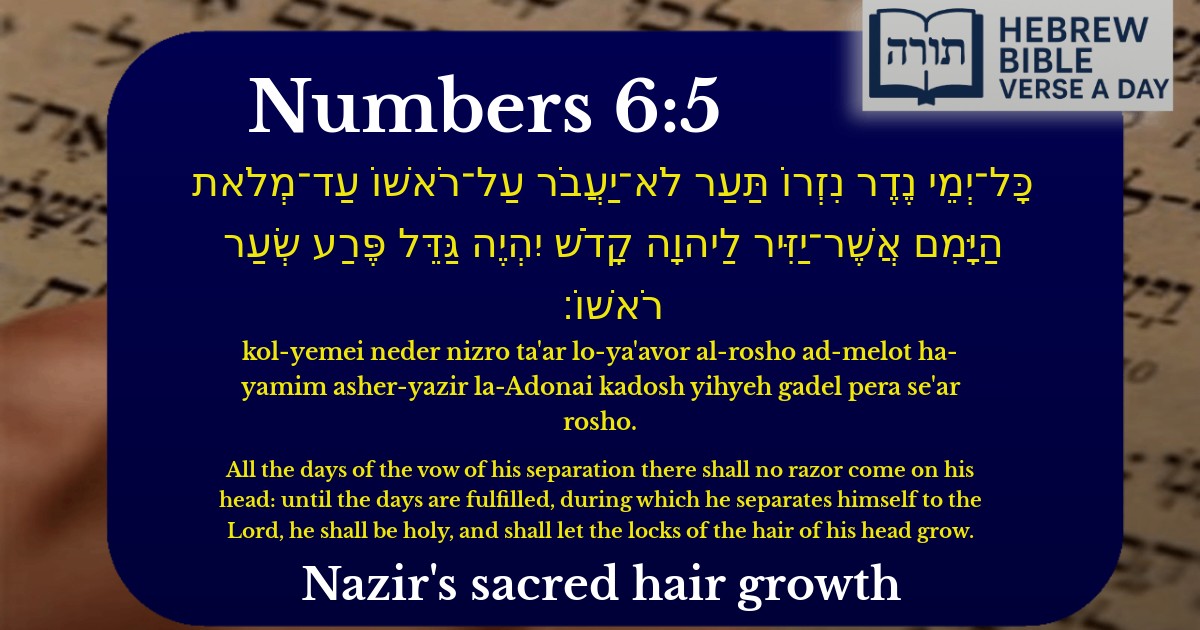Join Our Newsletter To Be Informed When New Videos Are Posted
Join the thousands of fellow Studends who rely on our videos to learn how to read the bible in Hebrew for free!
Hebrew Text
כָּל־יְמֵי נֶדֶר נִזְרוֹ תַּעַר לֹא־יַעֲבֹר עַל־רֹאשׁוֹ עַד־מְלֹאת הַיָּמִם אֲשֶׁר־יַזִּיר לַיהוָה קָדֹשׁ יִהְיֶה גַּדֵּל פֶּרַע שְׂעַר רֹאשׁוֹ׃
English Translation
All the days of the vow of his separation there shall no razor come on his head: until the days are fulfilled, during which he separates himself to the Lord, he shall be holy, and shall let the locks of the hair of his head grow.
Transliteration
Kol-yemei neder nizro ta'ar lo-ya'avor al-rosho ad-melot ha-yamim asher-yazir la-Adonai kadosh yihyeh gadel pera se'ar rosho.
Hebrew Leining Text
כׇּל־יְמֵי֙ נֶ֣דֶר נִזְר֔וֹ תַּ֖עַר לֹא־יַעֲבֹ֣ר עַל־רֹאשׁ֑וֹ עַד־מְלֹ֨את הַיָּמִ֜ם אֲשֶׁר־יַזִּ֤יר לַיהֹוָה֙ קָדֹ֣שׁ יִהְיֶ֔ה גַּדֵּ֥ל פֶּ֖רַע שְׂעַ֥ר רֹאשֽׁוֹ׃
כׇּל־יְמֵי֙ נֶ֣דֶר נִזְר֔וֹ תַּ֖עַר לֹא־יַעֲבֹ֣ר עַל־רֹאשׁ֑וֹ עַד־מְלֹ֨את הַיָּמִ֜ם אֲשֶׁר־יַזִּ֤יר לַיהֹוָה֙ קָדֹ֣שׁ יִהְיֶ֔ה גַּדֵּ֥ל פֶּ֖רַע שְׂעַ֥ר רֹאשֽׁוֹ׃
🎵 Listen to leining
Parasha Commentary
📚 Talmud Citations
This verse is quoted in the Talmud.
📖 Nazir 39a
The verse is discussed in the context of the laws of a Nazirite, particularly regarding the prohibition of cutting one's hair during the period of the vow.
📖 Sotah 2a
The verse is referenced in a discussion about the seriousness of vows and the sanctity associated with the Nazirite vow.


Understanding the Nazirite Vow
The verse (Bamidbar 6:5) discusses the laws of a nazir (Nazirite), who takes a vow of separation to Hashem. The prohibition against cutting one's hair is one of the three primary restrictions of a nazir, along with abstaining from wine and avoiding contact with the dead (as detailed in the preceding verses).
Rashi's Explanation
Rashi (Bamidbar 6:5) explains that the phrase "תער לא יעבור על ראשו" ("no razor shall come upon his head") means that even plucking a single hair with tweezers is forbidden. The prohibition is not limited to a razor but extends to any form of hair removal. This strict interpretation emphasizes the nazir's complete dedication to holiness during the vow period.
Rambam's Perspective
Rambam (Hilchot Nezirut 5:11) elaborates that the nazir's uncut hair serves as a visible sign of his consecration. By allowing his hair to grow, he publicly demonstrates his commitment to spiritual elevation. The hair becomes a siman kedushah (symbol of holiness), distinguishing him from others.
Midrashic Insights
The Midrash (Bamidbar Rabbah 10:10) compares the nazir's long hair to the kohen gadol's (high priest's) mitznefet (turban), suggesting that both represent a crown of devotion to Hashem. Just as the kohen gadol serves in the Mikdash, the nazir dedicates himself to a higher spiritual calling.
Halachic Implications
Spiritual Significance
The Sforno (Bamidbar 6:5) teaches that the nazir's uncut hair symbolizes his rejection of worldly vanity. By forgoing grooming, he focuses entirely on spiritual growth, embodying the ideal of "קדוש יהיה" ("he shall be holy"). This physical transformation reflects an inner commitment to draw closer to Hashem.